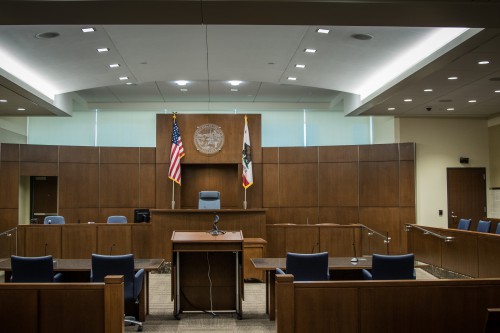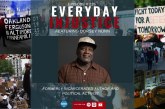 by Setarah Jahid
by Setarah Jahid
On November 18, a Friday afternoon, the preliminary hearing of Javier Moreno and Robert Holguin resumed. The case revolves around a single date – August 19, 2015, in West Sacramento – when Mr. Moreno is alleged to have knowingly aided in a gang sale, to an undercover officer, of an assault rifle in cahoots with two individuals – one named in court as Jason Broadbent, the other as defendant Robert Holguin.
The court found Joshua Mason, a former gang member, to be an expert on gangs, and so began a direct examination by the defense on “gang influenced communities.” According to Mason, the communities prone to gang influence are typically low-income, and the individuals within the communities become normalized to gang prevalence. It is perpetuated through media, music, and clothing. Mason explained that, to a minor growing up in such a community, their thought process is:
“Cool thing around my neighborhood is people dress this way. Cool thing around my neighborhood is people talk this way.”
Therefore, according to Mason, it is easy for law enforcement to misinterpret the reality of a person who lives in a gang-influenced community, to be indicative that the person is a gang member also. Previous testimony by law enforcement experts claimed that, in their experience, individuals partake in gang activities for notoriety, to build the reputation on the streets and to brand fear. Mr. Mason, however, offered insider evaluation. He offered the example, in a story, of a little boy growing up in a gang-influenced community. The little boy may not understand why he must avoid wearing blue, but after witnessing individuals who wear blue get injured by others, he learns quickly to accept that as a norm in order to protect himself. This is analogized to the facts of the specific case at hand with Mr. Moreno. Although through a search warrant, on an outsider’s phone, there are pictures of Mr. Moreno doing specific gang-related hand gestures and posing with people who are known to be gang-affiliated, it does not prove that he himself is a gang member as well.
In the midst of Mason’s testimony, Judge Samuel McAdam interjected a question. He asked the defense if the point that they were trying to make is to ignore the earlier testimonies of other gang experts who are members of law enforcement, such as Mr. Perez. Defense Attorney Leslie Ramos retorted no, her agenda is for the court to understand that a holistic view of gangs is needed in order to carry on with the defense’s argument on behalf of Mr. Moreno. It is easy to get caught up in the generalities of gangs provided by testimonials from law enforcement, but for each case that involves gangs, it is important to be case-specific.
Ms. Ramos also asked Mason a string of questions about tattoos and the significance they hold for gang affiliation. Her client, Moreno, had 104 tattooed behind his ears, and dots on his knuckles. Morgan explained that both tattoos of this nature are associated with the Northerners, the Norteños street gang. Additionally, Morgan testified to having seen these tattoos on Moreno with his own eyes, and that he noticed there were signs of removal. When further questioned by Ramos what signs of removal meant, he stated that it portrays an individual is either distancing themselves from a gang, or flat-out disassociating. He also mentioned that, by just looking at those tattoos, there is no way one can pinpoint when the tattoos had been applied, or when steps to remove them took place.
In the switch to cross-examination, prosecutor Robin Johnson asked Mr. Mason if he was familiar with the gang activity in Woodland, California. Mr. Morgan replied that he was not, in particular, familiar with Woodland. There were no further questions, and Mason was dismissed, ending the evidentiary phase of the case.
The prosecution set forth a list of 20 counts that tie Mr. Broadbent, Mr. Moreno, and Mr. Holguin together as co-conspirators on the day of August 19, 2015, with the sale of the assault rifle to an undercover police officer.
Mr. Rod Beede, defense attorney for Mr. Holguin, shared his opinion on this case. He stated that the prosecution has definitely made it clear that Mr. Broadbent ran a criminal gun sale, but they have not tied his client to the case. He argued that there is no evidence that Holguin even knew what was in the box which the defendants transported. The prosecution is claiming the three actors conspired together, but, in order for the prosecution to play the conspiracy card, there needs to be an agreement made from the actors involved. According to Beede, there is nothing in the discovery that proves an agreement was made. One fact was evident, however, in Mr. Beede’s opinion:
“The prosecution set a list of 20 counts that would scare the stuffing out of the jury.”
The court held the defendants to answer, and information on a trial date will be forthcoming.




